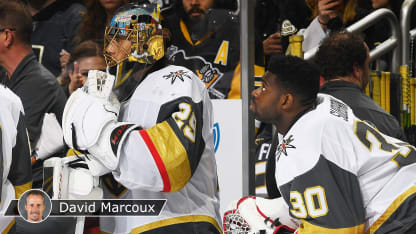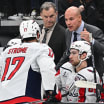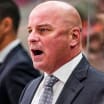The Coaches Room is a regular feature throughout the 2018-19 NHL season by one of four former NHL coaches and assistants who will turn their critical gaze to the game and explain it through the lens of a teacher. David Marcoux, Paul MacLean, Daniel Lacroix and Curt Fraser will take turns providing insight.
In this edition, Marcoux, former goalie coach for the Carolina Hurricanes and the Calgary Flames, explores the often-difficult decision of which goalie plays the next game.
Choosing starting goalie multipronged decision
Marcoux says state of team, schedule can factor into who plays

By
David Marcoux / Special to NHL.com
What goalie is starting the next game?
Sometimes the answer is not complicated. No. 1 goalies play the majority of games, but No. 1 goalies don't play every game, so what goes into the decision to start the backup?
There are numerous factors to be considered and it's often a conversation between the coach and the goalie coach that leads to the choice.
In the early days of the season, you can expect to find No. 1 goalies who haven't had a great start to the season getting plenty of leeway with their coaches in order to help them find a groove.
The benefit of the doubt comes easily, but it seems to me that past the 20-game mark, which is right around this point in the season, the need for wins often starts to override that patience.
The most obvious thing the coach and goalie coach consider is what happened in the last game. Beyond a win or a loss, were there any weak goals? How many Grade A or game-changing saves were there? They're all indicators of a goalie's sharpness.
And it's essential to look at intangible factors, like was there somebody like Patrik Hornqvist of the Pittsburgh Penguins in your goalie's cage all night?
The NHL is a results League but it's not always about what a goalie has done in his most recent game.
Sometimes, a goalie's age and health are factors.
With goalies like Roberto Luongo, 39, Craig Anderson, 37, and Mike Smith, 36, their mileage and health history need to be considered. If your backup goalie is helping, the coach and goalie coach may have more trust in resting their No. 1 goalie.
I think of how things went for Smith last season. He was excellent up until the time he got injured in February, then everything blew up on him and the Flames. It's important to monitor.
There is also the matter of the circumstance of the next game. Is it the second of a back-to-back? Is there travel involved? Are there time-zone changes involved? And what kind of game does the goalie play?
I watched a strong outing by Jonathan Quick in a 2-0 win against the Carolina Hurricanes on Sunday, but the type of energetic game he plays takes a toll on the body. And he's had some injuries so if there's travel to the next game, or back-to-back games coming up, there is a risk factor in playing him every night.
Marc-Andre Fleury of the Vegas Golden Knights is another goalie who plays an energetic game. Playing that type of goalie game after game, road and home, week after week could be courting trouble.
Knowing how to read those situations is a priority. I have been fortunate to work in the Eastern Conference and Western Conference, so I have some experience in the effects of the travel and the miles.
Edmonton Oilers coach Ken Hitchcock had a strong opinion on this after a 3-2 shootout victory against the St. Louis Blues on Wednesday. He said you can't win with one quality goalie in the Western Conference and that it's his job to find the right rhythm to keep Cam Talbot and Mikko Koskinen sharp.
Ken Hitchcock on having two reliable goalie options
The comfort level some goalies have in different arenas is another thing to consider.
I can remember Cam Ward with the Carolina Hurricanes having an unbelievable record in Philadelphia. He just felt great playing there. There can be something about buildings and environments that just work for goalies and those numbers and records were always something I tried to monitor and consider and show to the coach when it was appropriate.
Related to that is how some goalies play against certain teams. The best example that comes to mind is Jaroslav Halak. I always thought because of his great reads and lateral movements, he was one of the best goalies against strong one-timing teams like the Washington Capitals or Tampa Bay Lightning.
One of the biggest factors in the decision of who plays is how to deal with a goalie who genuinely wants to play all 82 games.
You've heard this talk often, but it's just not realistic. A good goalie coach might be able to use this kind of mentality, or let it use him.
You can tell your No. 1 goalie if he's not playing the next game because the coach has decided to go the other way that it should fuel his fire for his next start.
I've done this a time or two, telling the No. 1 goalie to be upset but not to dwell on it, to just show the coach he was wrong.
The decision on a goalie for the next game can also come down to what kind of pressure is on the team and the coach.
What's the level of urgency for reaching a playoff spot? Is a coach on the hot seat going to live and die with his backup very often? I think he tends to rely on his veterans, including his No. 1 goalie, figuring if they need rest, they can do it in the offseason.
In the end, it's fair to ask, who gets the final say?
Some coaches rely more on their assistants and goalie coaches than others.
I'd guess that Chicago Blackhawks coach Jeremy Colliton would be putting some value into the advice he gets from goalie coach Jimmy Waite.
I knew Flames coach and former Hurricanes coach Bill Peters to be someone who liked input from assistants and considered the decision a collaboration.
In my experience, the choice always belonged to the coach.
I was an assistant under Darryl Sutter, Jim Playfair and Mike Keenan in Calgary and Peters in Carolina and I always considered my input as suggestion.
The coach is driving the bus and he has to face all consequences, so you want to give him all the important and relevant elements to this equation to help him make a decision.
And there are many elements to this discussion, more than fans may suspect. I may have liked or agreed with the decision or not, but I always went along. Supporting the coach's choice is the right thing to do.

















